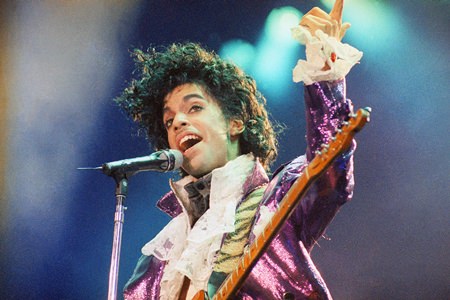Chanhassen, Minn. (AP) – Prince could play guitar like Carlos Santana or Jimi Hendrix, sing like James Brown, turn out pop melodies worthy of Motown or lay down the deepest grooves this side of Sly and the Family Stone. But no one could mistake his sound for anyone but Prince.
The dazzlingly talented and charismatic singer, songwriter, arranger and instrumentalist who died last week at his home drew upon the history of modern popular music and created a gender- and genre-defying blend of rock, funk and soul. With hits including “1999,” ‘’Purple Rain” and “Little Red Corvette,” Prince’s records sold more than 100 million copies and earned him Grammys and an Academy Award.
 Prince is shown performing at the Forum in Inglewood, California in this Feb. 18, 1985 file photo. (AP Photo/Liu Heung Shing, File)
Prince is shown performing at the Forum in Inglewood, California in this Feb. 18, 1985 file photo. (AP Photo/Liu Heung Shing, File)
The Minneapolis native stood just 5 feet, 2 inches, yet made a powerful visual impact at the dawn of the MTV era, proving to be the Little Richard for the ’80s, from his wispy moustache and tall pompadour to his colorful and suggestive outfits — the counterpart to the openly erotic lyrics that made him one of the most sexually daring artists of the era.
But his greatest legacy was as a musician, summoning original and compelling sounds at will, whether playing guitar in a flamboyant style that drew on Hendrix, switching his vocals from a nasally scream to an erotic falsetto, or turning out album after album of stunningly innovative material. Among his other notable releases: “Sign O’ the Times,” ‘’Graffiti Bridge” and “The Black Album.”
“He rewrote the rulebook, forging a synthesis of black funk and white rock that served as a blueprint for cutting-edge music in the Eighties,” reads his dedication in the Rock and Roll Hall of Fame. “Prince made dance music that rocked and rock music that had a bristling, funky backbone. From the beginning, Prince and his music were androgynous, sly, sexy and provocative.”
The 57-year-old superstar passed away Thursday, April 21 at his home in suburban Minneapolis. The local sheriff said deputies found Prince unresponsive in an elevator late Thursday morning after being summoned to his home, but that first-responders couldn’t revive him. No details about what may have caused his death had been released at press time.
Mick Jagger was among numerous musicians, actors and other public figures praising the artist, tweeting: “Prince’s talent was limitless. He was one of the most unique and talented artists of the last 30 years.” Madonna called him a “true visionary,” while Oprah Winfrey tweeted: “Prince the doves really are crying now. Listening to your music. Remembering you.”
Born Prince Rogers Nelson, Prince broke through in the late 1970s with the hits “Why You Wanna Treat Me So Bad?” and “I Wanna Be Your Lover,” and soared over the following decade with such albums as “1999” and “Purple Rain.” The title song from “1999,” his funky and flippant anthem about an oncoming nuclear holocaust, includes one of the most quoted refrains of popular culture: “Tonight I’m gonna party like it’s 1999.”
He won seven Grammys and received an Academy Award in 1985 for his music from the movie “Purple Rain.” In 2004, Prince was inducted into the Rock and Roll of Fame, which hailed him as a musical and social trailblazer.
Prince made his acting debut in “Purple Rain,” playing a sexy, androgynous young musician on the cusp of fame. The film amplified Prince’s popularity and was a box-office success with $68 million in ticket sales. Besides winning the Oscar for Original Song Score, the “Purple Rain” soundtrack won Grammys for its writing and performance. The film received mixed reviews, but Roger Ebert called it “one of the best combinations I’ve seen of music and drama.”
Prince was fiercely protective of his independence, battling his record company over control of his material and even his name. Anxious to get out of his contract with Warner Bros., he identified himself by a key-like symbol with an unpronounceable name. (Journalists called him “TAFKAP,” or The Artist Formerly Known as Prince). Prince also once wrote “slave” on his face in protest of not owning his work and famously fought and then departed Warner, before returning a few years ago.
“What’s happening now is the position that I’ve always wanted to be in,” Prince told The Associated Press in 2014. “I was just trying to get here.”
Prince had been touring and recording right up until his death, releasing four albums in the last 18 months, including two on the Tidal streaming service last year.
The musician seemed to be shedding his reclusive reputation. He hosted several late-night jam sessions where he serenaded Madonna, celebrated the Minnesota Lynx’s WNBA championship and showcased his latest protege, singer Judith Hill.
Ever surprising, he announced on stage in New York City last month that he was writing his memoir, “The Beautiful Ones,” which was expected to be released in the fall of 2017 by publishing house Spiegel & Grau. A press release about the memoir said Prince would “take readers on an unconventional and poetic journey through his life and creative work,” and include stories about his music, family and the “people, places and ideas that fired his creative imagination.”
A spokeswoman for Spiegel & Grau, Theresa Zoro, said Thursday the publisher had no immediate comment on the book’s status.




